Company Law Case Study: Sunshine Pty Ltd, Director Responsibilities
VerifiedAdded on 2021/02/22
|8
|2294
|205
Case Study
AI Summary
This case study analyzes the winding up of Sunshine Pty Ltd, focusing on the roles and responsibilities of the directors, Sun and Ray, and the appointed liquidator, Mr. Moon. The case explores issues of overdue payments, financial mismanagement, and the company's insolvency. It examines the application of the Corporations Act 2001, particularly Section 471B, and relevant case law such as MSI Pty Ltd v. Mainstreet International Group Limited. The study also presents a second scenario involving the Australian Securities and Investment Commission (ASIC) and its role in protecting creditors' interests. It highlights the potential liabilities of the directors, especially Sun, for financial breaches and the legal advice provided in both scenarios. The analysis emphasizes the importance of proper financial record-keeping and the consequences of failing to meet obligations to creditors and banks, including potential personal liability for directors. The study concludes with references to relevant books and journals on company law and corporate governance.
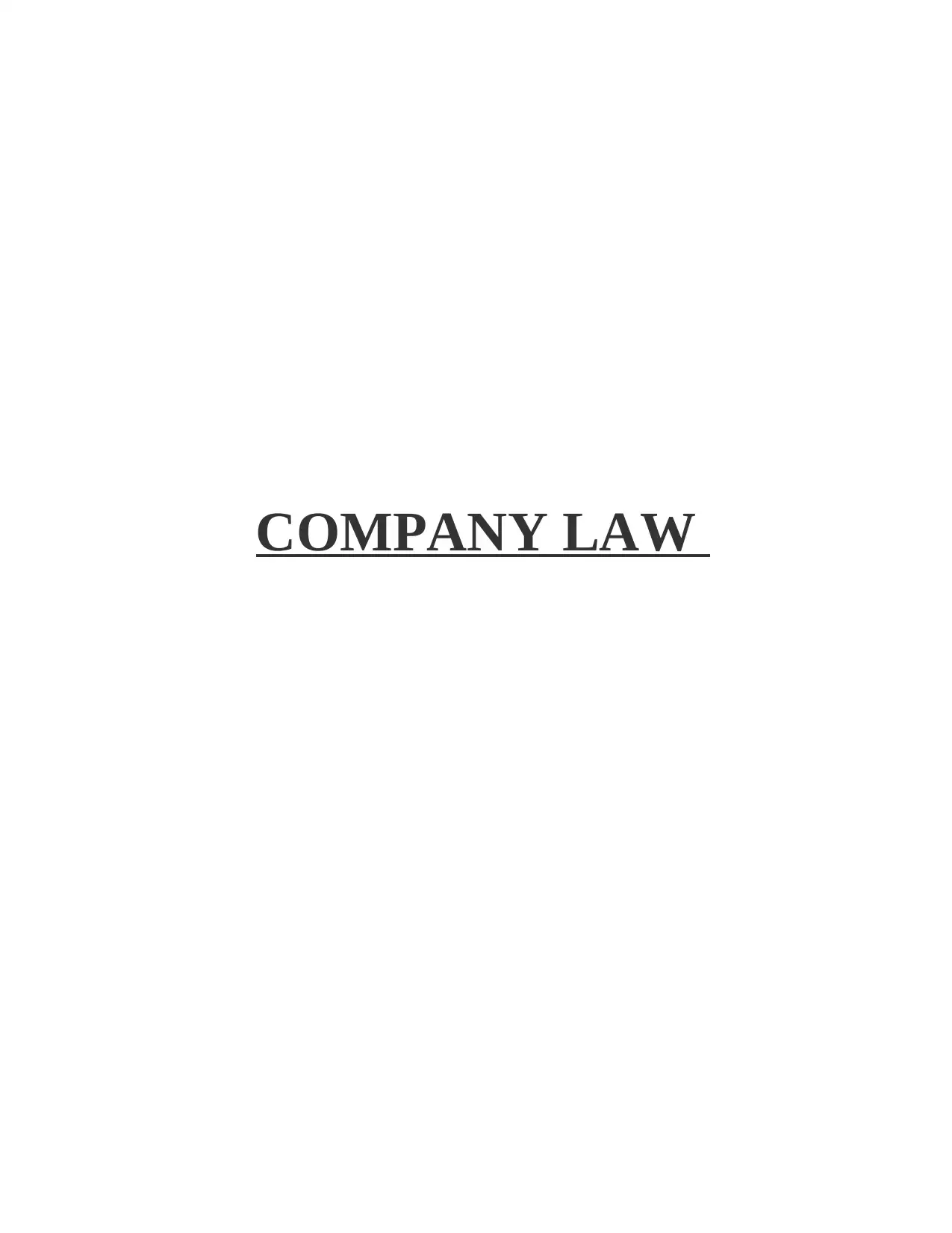
COMPANY LAW
Paraphrase This Document
Need a fresh take? Get an instant paraphrase of this document with our AI Paraphraser
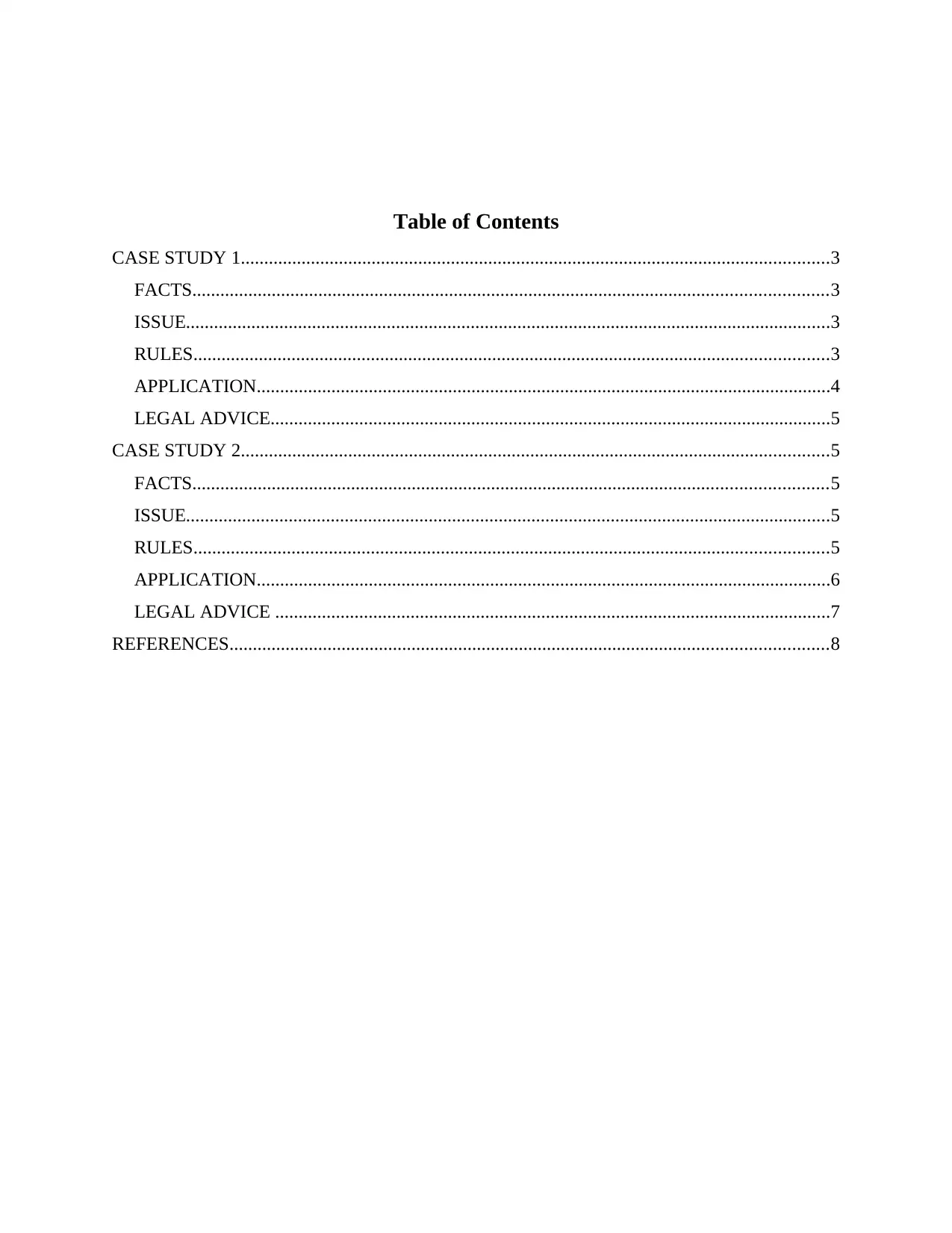
Table of Contents
CASE STUDY 1..............................................................................................................................3
FACTS........................................................................................................................................3
ISSUE..........................................................................................................................................3
RULES........................................................................................................................................3
APPLICATION...........................................................................................................................4
LEGAL ADVICE........................................................................................................................5
CASE STUDY 2..............................................................................................................................5
FACTS........................................................................................................................................5
ISSUE..........................................................................................................................................5
RULES........................................................................................................................................5
APPLICATION...........................................................................................................................6
LEGAL ADVICE .......................................................................................................................7
REFERENCES................................................................................................................................8
CASE STUDY 1..............................................................................................................................3
FACTS........................................................................................................................................3
ISSUE..........................................................................................................................................3
RULES........................................................................................................................................3
APPLICATION...........................................................................................................................4
LEGAL ADVICE........................................................................................................................5
CASE STUDY 2..............................................................................................................................5
FACTS........................................................................................................................................5
ISSUE..........................................................................................................................................5
RULES........................................................................................................................................5
APPLICATION...........................................................................................................................6
LEGAL ADVICE .......................................................................................................................7
REFERENCES................................................................................................................................8
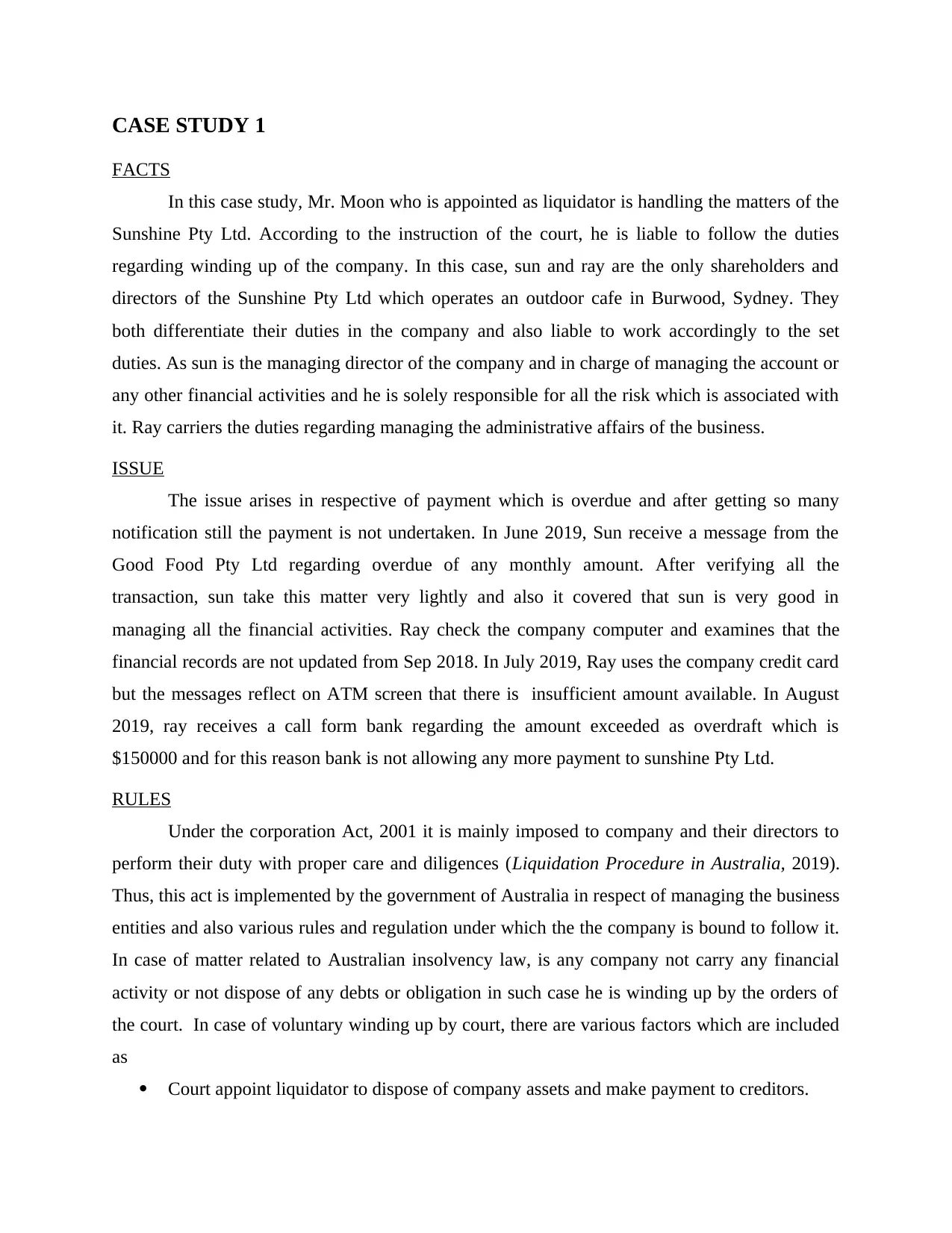
CASE STUDY 1
FACTS
In this case study, Mr. Moon who is appointed as liquidator is handling the matters of the
Sunshine Pty Ltd. According to the instruction of the court, he is liable to follow the duties
regarding winding up of the company. In this case, sun and ray are the only shareholders and
directors of the Sunshine Pty Ltd which operates an outdoor cafe in Burwood, Sydney. They
both differentiate their duties in the company and also liable to work accordingly to the set
duties. As sun is the managing director of the company and in charge of managing the account or
any other financial activities and he is solely responsible for all the risk which is associated with
it. Ray carriers the duties regarding managing the administrative affairs of the business.
ISSUE
The issue arises in respective of payment which is overdue and after getting so many
notification still the payment is not undertaken. In June 2019, Sun receive a message from the
Good Food Pty Ltd regarding overdue of any monthly amount. After verifying all the
transaction, sun take this matter very lightly and also it covered that sun is very good in
managing all the financial activities. Ray check the company computer and examines that the
financial records are not updated from Sep 2018. In July 2019, Ray uses the company credit card
but the messages reflect on ATM screen that there is insufficient amount available. In August
2019, ray receives a call form bank regarding the amount exceeded as overdraft which is
$150000 and for this reason bank is not allowing any more payment to sunshine Pty Ltd.
RULES
Under the corporation Act, 2001 it is mainly imposed to company and their directors to
perform their duty with proper care and diligences (Liquidation Procedure in Australia, 2019).
Thus, this act is implemented by the government of Australia in respect of managing the business
entities and also various rules and regulation under which the the company is bound to follow it.
In case of matter related to Australian insolvency law, is any company not carry any financial
activity or not dispose of any debts or obligation in such case he is winding up by the orders of
the court. In case of voluntary winding up by court, there are various factors which are included
as
Court appoint liquidator to dispose of company assets and make payment to creditors.
FACTS
In this case study, Mr. Moon who is appointed as liquidator is handling the matters of the
Sunshine Pty Ltd. According to the instruction of the court, he is liable to follow the duties
regarding winding up of the company. In this case, sun and ray are the only shareholders and
directors of the Sunshine Pty Ltd which operates an outdoor cafe in Burwood, Sydney. They
both differentiate their duties in the company and also liable to work accordingly to the set
duties. As sun is the managing director of the company and in charge of managing the account or
any other financial activities and he is solely responsible for all the risk which is associated with
it. Ray carriers the duties regarding managing the administrative affairs of the business.
ISSUE
The issue arises in respective of payment which is overdue and after getting so many
notification still the payment is not undertaken. In June 2019, Sun receive a message from the
Good Food Pty Ltd regarding overdue of any monthly amount. After verifying all the
transaction, sun take this matter very lightly and also it covered that sun is very good in
managing all the financial activities. Ray check the company computer and examines that the
financial records are not updated from Sep 2018. In July 2019, Ray uses the company credit card
but the messages reflect on ATM screen that there is insufficient amount available. In August
2019, ray receives a call form bank regarding the amount exceeded as overdraft which is
$150000 and for this reason bank is not allowing any more payment to sunshine Pty Ltd.
RULES
Under the corporation Act, 2001 it is mainly imposed to company and their directors to
perform their duty with proper care and diligences (Liquidation Procedure in Australia, 2019).
Thus, this act is implemented by the government of Australia in respect of managing the business
entities and also various rules and regulation under which the the company is bound to follow it.
In case of matter related to Australian insolvency law, is any company not carry any financial
activity or not dispose of any debts or obligation in such case he is winding up by the orders of
the court. In case of voluntary winding up by court, there are various factors which are included
as
Court appoint liquidator to dispose of company assets and make payment to creditors.
⊘ This is a preview!⊘
Do you want full access?
Subscribe today to unlock all pages.

Trusted by 1+ million students worldwide
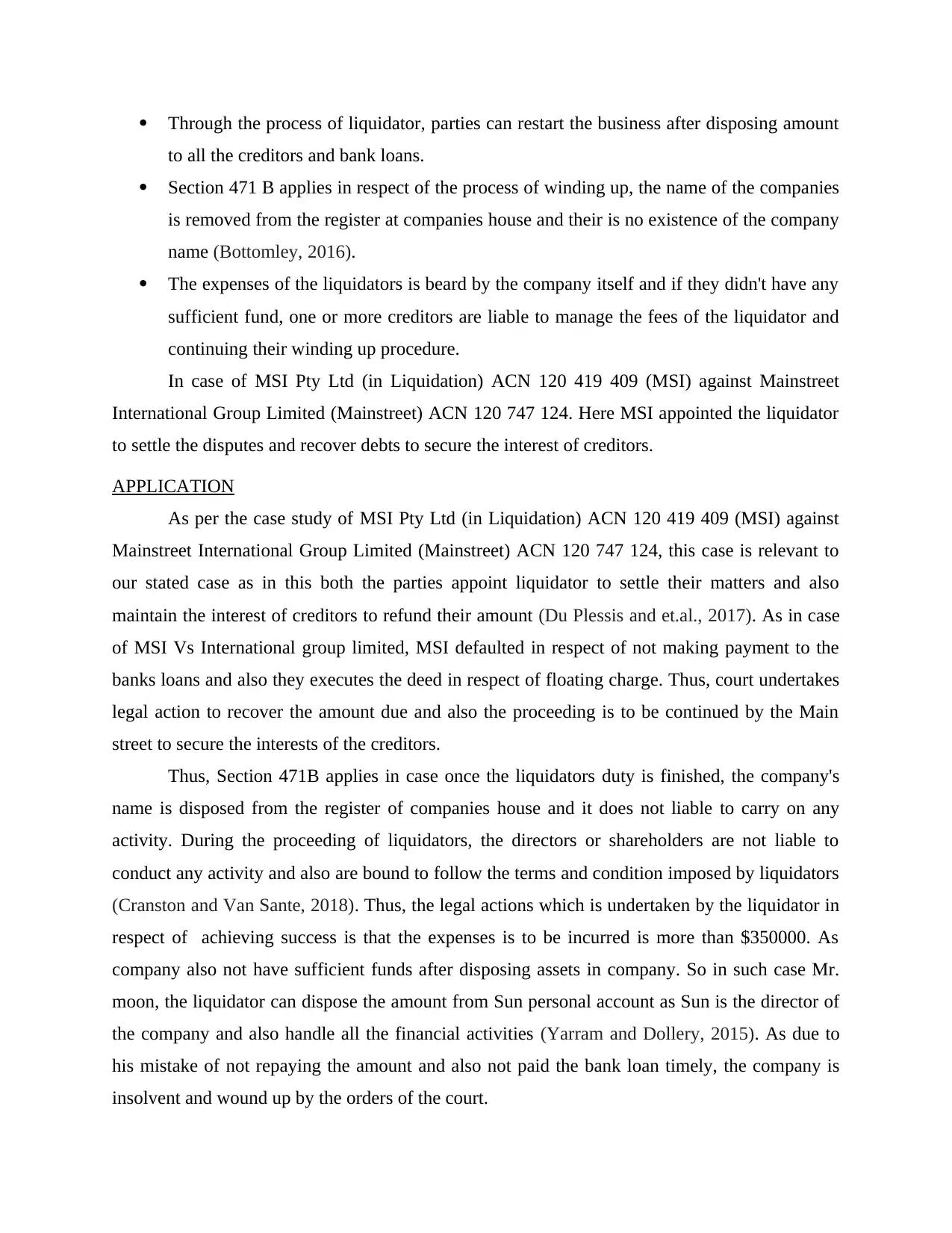
Through the process of liquidator, parties can restart the business after disposing amount
to all the creditors and bank loans.
Section 471 B applies in respect of the process of winding up, the name of the companies
is removed from the register at companies house and their is no existence of the company
name (Bottomley, 2016).
The expenses of the liquidators is beard by the company itself and if they didn't have any
sufficient fund, one or more creditors are liable to manage the fees of the liquidator and
continuing their winding up procedure.
In case of MSI Pty Ltd (in Liquidation) ACN 120 419 409 (MSI) against Mainstreet
International Group Limited (Mainstreet) ACN 120 747 124. Here MSI appointed the liquidator
to settle the disputes and recover debts to secure the interest of creditors.
APPLICATION
As per the case study of MSI Pty Ltd (in Liquidation) ACN 120 419 409 (MSI) against
Mainstreet International Group Limited (Mainstreet) ACN 120 747 124, this case is relevant to
our stated case as in this both the parties appoint liquidator to settle their matters and also
maintain the interest of creditors to refund their amount (Du Plessis and et.al., 2017). As in case
of MSI Vs International group limited, MSI defaulted in respect of not making payment to the
banks loans and also they executes the deed in respect of floating charge. Thus, court undertakes
legal action to recover the amount due and also the proceeding is to be continued by the Main
street to secure the interests of the creditors.
Thus, Section 471B applies in case once the liquidators duty is finished, the company's
name is disposed from the register of companies house and it does not liable to carry on any
activity. During the proceeding of liquidators, the directors or shareholders are not liable to
conduct any activity and also are bound to follow the terms and condition imposed by liquidators
(Cranston and Van Sante, 2018). Thus, the legal actions which is undertaken by the liquidator in
respect of achieving success is that the expenses is to be incurred is more than $350000. As
company also not have sufficient funds after disposing assets in company. So in such case Mr.
moon, the liquidator can dispose the amount from Sun personal account as Sun is the director of
the company and also handle all the financial activities (Yarram and Dollery, 2015). As due to
his mistake of not repaying the amount and also not paid the bank loan timely, the company is
insolvent and wound up by the orders of the court.
to all the creditors and bank loans.
Section 471 B applies in respect of the process of winding up, the name of the companies
is removed from the register at companies house and their is no existence of the company
name (Bottomley, 2016).
The expenses of the liquidators is beard by the company itself and if they didn't have any
sufficient fund, one or more creditors are liable to manage the fees of the liquidator and
continuing their winding up procedure.
In case of MSI Pty Ltd (in Liquidation) ACN 120 419 409 (MSI) against Mainstreet
International Group Limited (Mainstreet) ACN 120 747 124. Here MSI appointed the liquidator
to settle the disputes and recover debts to secure the interest of creditors.
APPLICATION
As per the case study of MSI Pty Ltd (in Liquidation) ACN 120 419 409 (MSI) against
Mainstreet International Group Limited (Mainstreet) ACN 120 747 124, this case is relevant to
our stated case as in this both the parties appoint liquidator to settle their matters and also
maintain the interest of creditors to refund their amount (Du Plessis and et.al., 2017). As in case
of MSI Vs International group limited, MSI defaulted in respect of not making payment to the
banks loans and also they executes the deed in respect of floating charge. Thus, court undertakes
legal action to recover the amount due and also the proceeding is to be continued by the Main
street to secure the interests of the creditors.
Thus, Section 471B applies in case once the liquidators duty is finished, the company's
name is disposed from the register of companies house and it does not liable to carry on any
activity. During the proceeding of liquidators, the directors or shareholders are not liable to
conduct any activity and also are bound to follow the terms and condition imposed by liquidators
(Cranston and Van Sante, 2018). Thus, the legal actions which is undertaken by the liquidator in
respect of achieving success is that the expenses is to be incurred is more than $350000. As
company also not have sufficient funds after disposing assets in company. So in such case Mr.
moon, the liquidator can dispose the amount from Sun personal account as Sun is the director of
the company and also handle all the financial activities (Yarram and Dollery, 2015). As due to
his mistake of not repaying the amount and also not paid the bank loan timely, the company is
insolvent and wound up by the orders of the court.
Paraphrase This Document
Need a fresh take? Get an instant paraphrase of this document with our AI Paraphraser
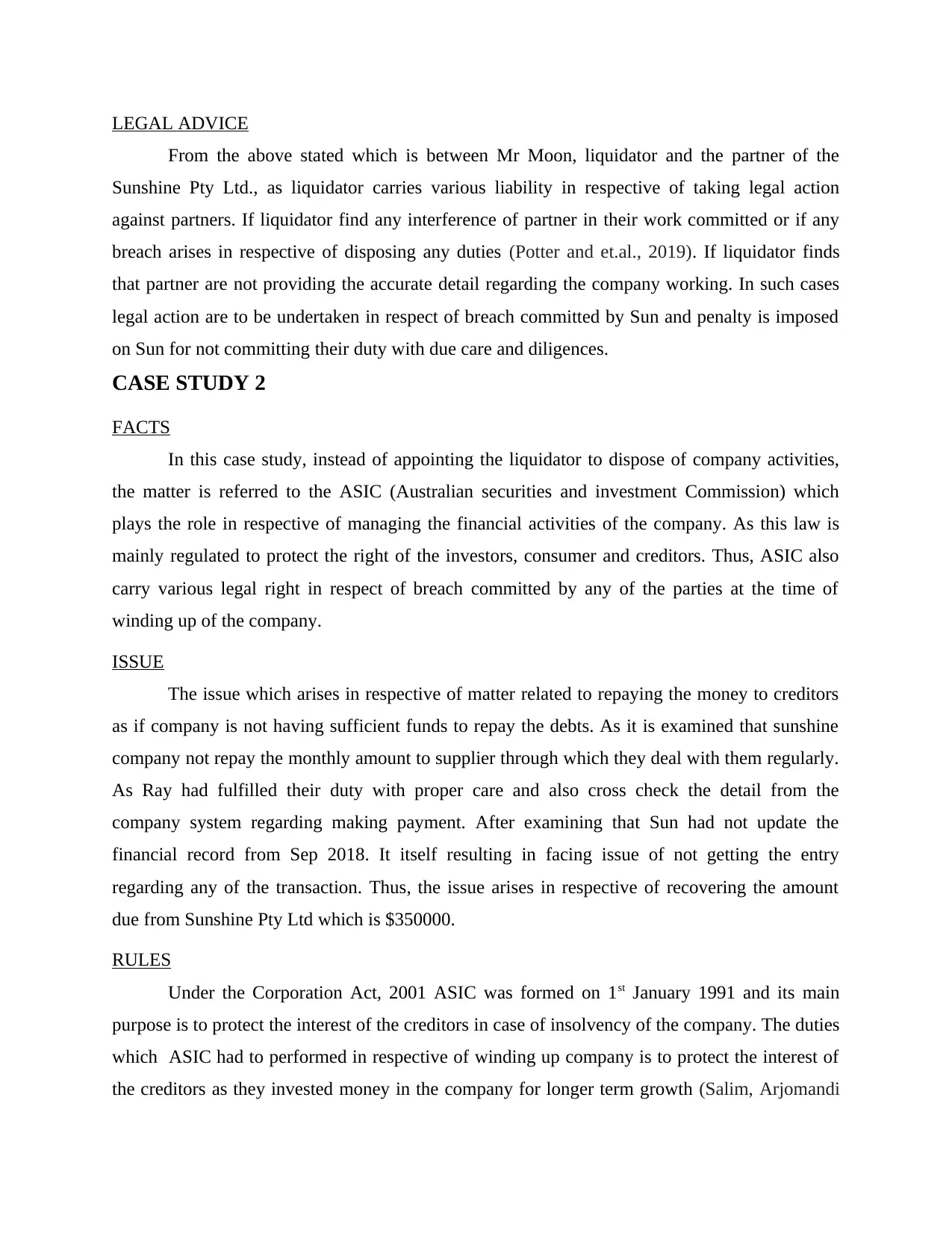
LEGAL ADVICE
From the above stated which is between Mr Moon, liquidator and the partner of the
Sunshine Pty Ltd., as liquidator carries various liability in respective of taking legal action
against partners. If liquidator find any interference of partner in their work committed or if any
breach arises in respective of disposing any duties (Potter and et.al., 2019). If liquidator finds
that partner are not providing the accurate detail regarding the company working. In such cases
legal action are to be undertaken in respect of breach committed by Sun and penalty is imposed
on Sun for not committing their duty with due care and diligences.
CASE STUDY 2
FACTS
In this case study, instead of appointing the liquidator to dispose of company activities,
the matter is referred to the ASIC (Australian securities and investment Commission) which
plays the role in respective of managing the financial activities of the company. As this law is
mainly regulated to protect the right of the investors, consumer and creditors. Thus, ASIC also
carry various legal right in respect of breach committed by any of the parties at the time of
winding up of the company.
ISSUE
The issue which arises in respective of matter related to repaying the money to creditors
as if company is not having sufficient funds to repay the debts. As it is examined that sunshine
company not repay the monthly amount to supplier through which they deal with them regularly.
As Ray had fulfilled their duty with proper care and also cross check the detail from the
company system regarding making payment. After examining that Sun had not update the
financial record from Sep 2018. It itself resulting in facing issue of not getting the entry
regarding any of the transaction. Thus, the issue arises in respective of recovering the amount
due from Sunshine Pty Ltd which is $350000.
RULES
Under the Corporation Act, 2001 ASIC was formed on 1st January 1991 and its main
purpose is to protect the interest of the creditors in case of insolvency of the company. The duties
which ASIC had to performed in respective of winding up company is to protect the interest of
the creditors as they invested money in the company for longer term growth (Salim, Arjomandi
From the above stated which is between Mr Moon, liquidator and the partner of the
Sunshine Pty Ltd., as liquidator carries various liability in respective of taking legal action
against partners. If liquidator find any interference of partner in their work committed or if any
breach arises in respective of disposing any duties (Potter and et.al., 2019). If liquidator finds
that partner are not providing the accurate detail regarding the company working. In such cases
legal action are to be undertaken in respect of breach committed by Sun and penalty is imposed
on Sun for not committing their duty with due care and diligences.
CASE STUDY 2
FACTS
In this case study, instead of appointing the liquidator to dispose of company activities,
the matter is referred to the ASIC (Australian securities and investment Commission) which
plays the role in respective of managing the financial activities of the company. As this law is
mainly regulated to protect the right of the investors, consumer and creditors. Thus, ASIC also
carry various legal right in respect of breach committed by any of the parties at the time of
winding up of the company.
ISSUE
The issue which arises in respective of matter related to repaying the money to creditors
as if company is not having sufficient funds to repay the debts. As it is examined that sunshine
company not repay the monthly amount to supplier through which they deal with them regularly.
As Ray had fulfilled their duty with proper care and also cross check the detail from the
company system regarding making payment. After examining that Sun had not update the
financial record from Sep 2018. It itself resulting in facing issue of not getting the entry
regarding any of the transaction. Thus, the issue arises in respective of recovering the amount
due from Sunshine Pty Ltd which is $350000.
RULES
Under the Corporation Act, 2001 ASIC was formed on 1st January 1991 and its main
purpose is to protect the interest of the creditors in case of insolvency of the company. The duties
which ASIC had to performed in respective of winding up company is to protect the interest of
the creditors as they invested money in the company for longer term growth (Salim, Arjomandi
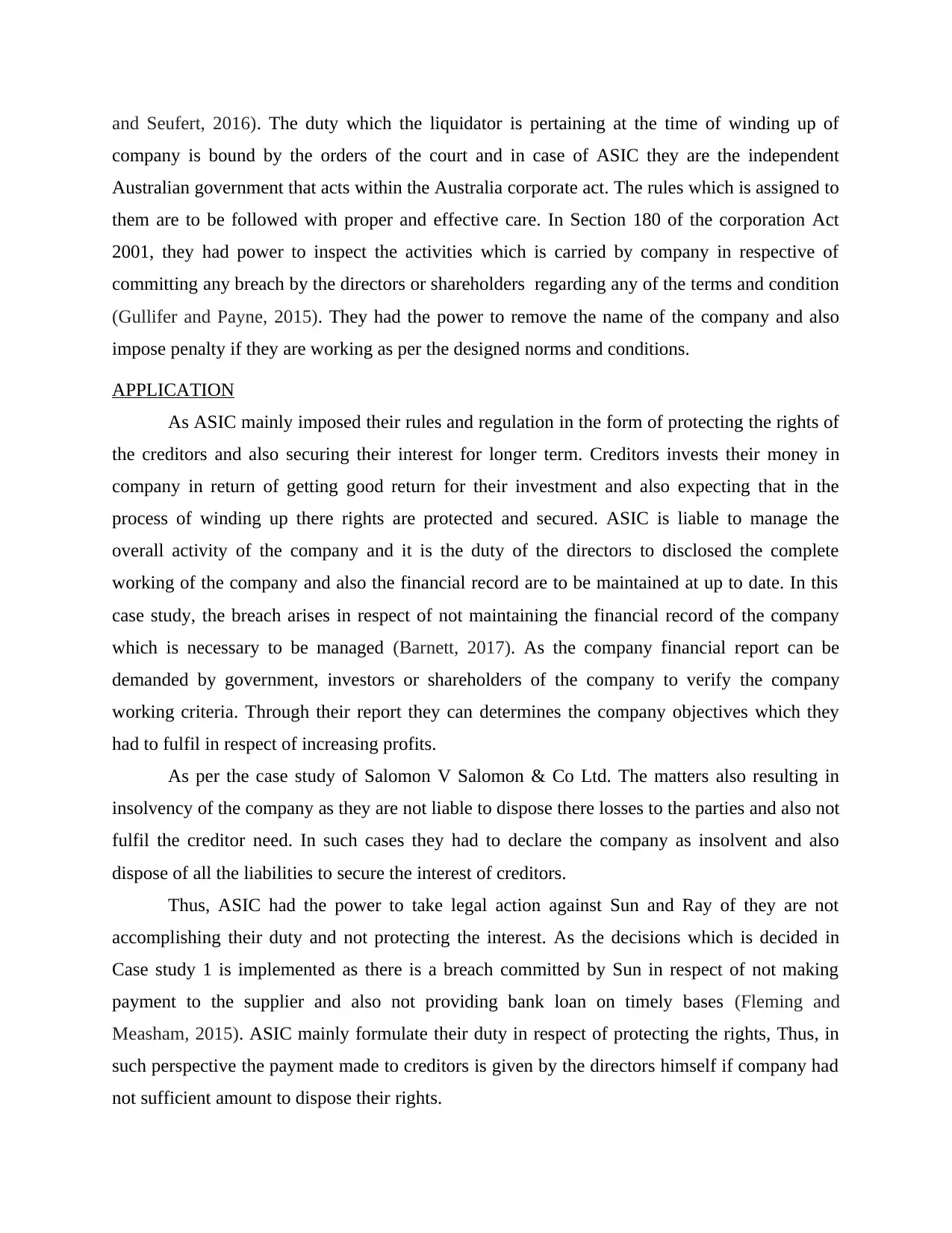
and Seufert, 2016). The duty which the liquidator is pertaining at the time of winding up of
company is bound by the orders of the court and in case of ASIC they are the independent
Australian government that acts within the Australia corporate act. The rules which is assigned to
them are to be followed with proper and effective care. In Section 180 of the corporation Act
2001, they had power to inspect the activities which is carried by company in respective of
committing any breach by the directors or shareholders regarding any of the terms and condition
(Gullifer and Payne, 2015). They had the power to remove the name of the company and also
impose penalty if they are working as per the designed norms and conditions.
APPLICATION
As ASIC mainly imposed their rules and regulation in the form of protecting the rights of
the creditors and also securing their interest for longer term. Creditors invests their money in
company in return of getting good return for their investment and also expecting that in the
process of winding up there rights are protected and secured. ASIC is liable to manage the
overall activity of the company and it is the duty of the directors to disclosed the complete
working of the company and also the financial record are to be maintained at up to date. In this
case study, the breach arises in respect of not maintaining the financial record of the company
which is necessary to be managed (Barnett, 2017). As the company financial report can be
demanded by government, investors or shareholders of the company to verify the company
working criteria. Through their report they can determines the company objectives which they
had to fulfil in respect of increasing profits.
As per the case study of Salomon V Salomon & Co Ltd. The matters also resulting in
insolvency of the company as they are not liable to dispose there losses to the parties and also not
fulfil the creditor need. In such cases they had to declare the company as insolvent and also
dispose of all the liabilities to secure the interest of creditors.
Thus, ASIC had the power to take legal action against Sun and Ray of they are not
accomplishing their duty and not protecting the interest. As the decisions which is decided in
Case study 1 is implemented as there is a breach committed by Sun in respect of not making
payment to the supplier and also not providing bank loan on timely bases (Fleming and
Measham, 2015). ASIC mainly formulate their duty in respect of protecting the rights, Thus, in
such perspective the payment made to creditors is given by the directors himself if company had
not sufficient amount to dispose their rights.
company is bound by the orders of the court and in case of ASIC they are the independent
Australian government that acts within the Australia corporate act. The rules which is assigned to
them are to be followed with proper and effective care. In Section 180 of the corporation Act
2001, they had power to inspect the activities which is carried by company in respective of
committing any breach by the directors or shareholders regarding any of the terms and condition
(Gullifer and Payne, 2015). They had the power to remove the name of the company and also
impose penalty if they are working as per the designed norms and conditions.
APPLICATION
As ASIC mainly imposed their rules and regulation in the form of protecting the rights of
the creditors and also securing their interest for longer term. Creditors invests their money in
company in return of getting good return for their investment and also expecting that in the
process of winding up there rights are protected and secured. ASIC is liable to manage the
overall activity of the company and it is the duty of the directors to disclosed the complete
working of the company and also the financial record are to be maintained at up to date. In this
case study, the breach arises in respect of not maintaining the financial record of the company
which is necessary to be managed (Barnett, 2017). As the company financial report can be
demanded by government, investors or shareholders of the company to verify the company
working criteria. Through their report they can determines the company objectives which they
had to fulfil in respect of increasing profits.
As per the case study of Salomon V Salomon & Co Ltd. The matters also resulting in
insolvency of the company as they are not liable to dispose there losses to the parties and also not
fulfil the creditor need. In such cases they had to declare the company as insolvent and also
dispose of all the liabilities to secure the interest of creditors.
Thus, ASIC had the power to take legal action against Sun and Ray of they are not
accomplishing their duty and not protecting the interest. As the decisions which is decided in
Case study 1 is implemented as there is a breach committed by Sun in respect of not making
payment to the supplier and also not providing bank loan on timely bases (Fleming and
Measham, 2015). ASIC mainly formulate their duty in respect of protecting the rights, Thus, in
such perspective the payment made to creditors is given by the directors himself if company had
not sufficient amount to dispose their rights.
⊘ This is a preview!⊘
Do you want full access?
Subscribe today to unlock all pages.

Trusted by 1+ million students worldwide
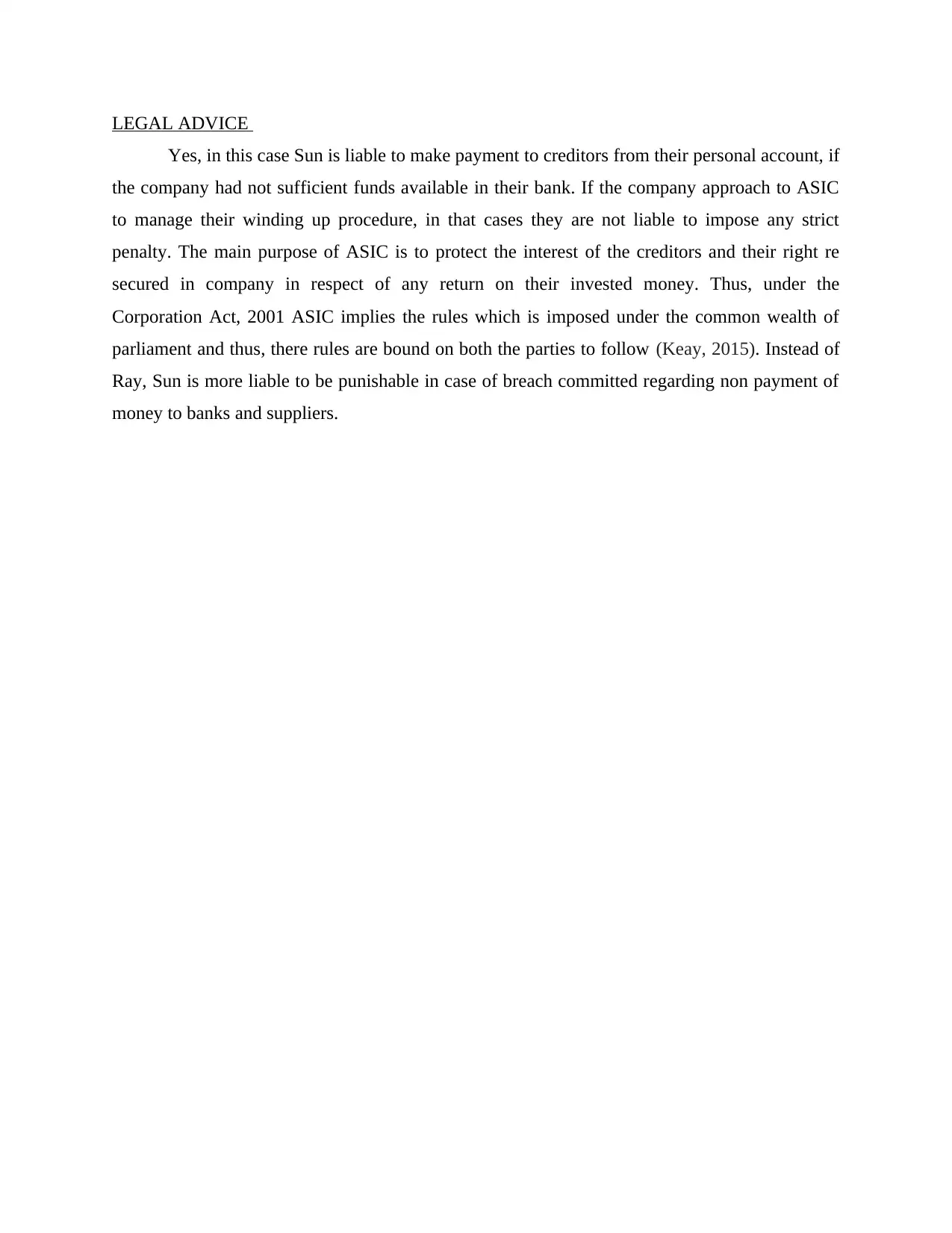
LEGAL ADVICE
Yes, in this case Sun is liable to make payment to creditors from their personal account, if
the company had not sufficient funds available in their bank. If the company approach to ASIC
to manage their winding up procedure, in that cases they are not liable to impose any strict
penalty. The main purpose of ASIC is to protect the interest of the creditors and their right re
secured in company in respect of any return on their invested money. Thus, under the
Corporation Act, 2001 ASIC implies the rules which is imposed under the common wealth of
parliament and thus, there rules are bound on both the parties to follow (Keay, 2015). Instead of
Ray, Sun is more liable to be punishable in case of breach committed regarding non payment of
money to banks and suppliers.
Yes, in this case Sun is liable to make payment to creditors from their personal account, if
the company had not sufficient funds available in their bank. If the company approach to ASIC
to manage their winding up procedure, in that cases they are not liable to impose any strict
penalty. The main purpose of ASIC is to protect the interest of the creditors and their right re
secured in company in respect of any return on their invested money. Thus, under the
Corporation Act, 2001 ASIC implies the rules which is imposed under the common wealth of
parliament and thus, there rules are bound on both the parties to follow (Keay, 2015). Instead of
Ray, Sun is more liable to be punishable in case of breach committed regarding non payment of
money to banks and suppliers.
Paraphrase This Document
Need a fresh take? Get an instant paraphrase of this document with our AI Paraphraser
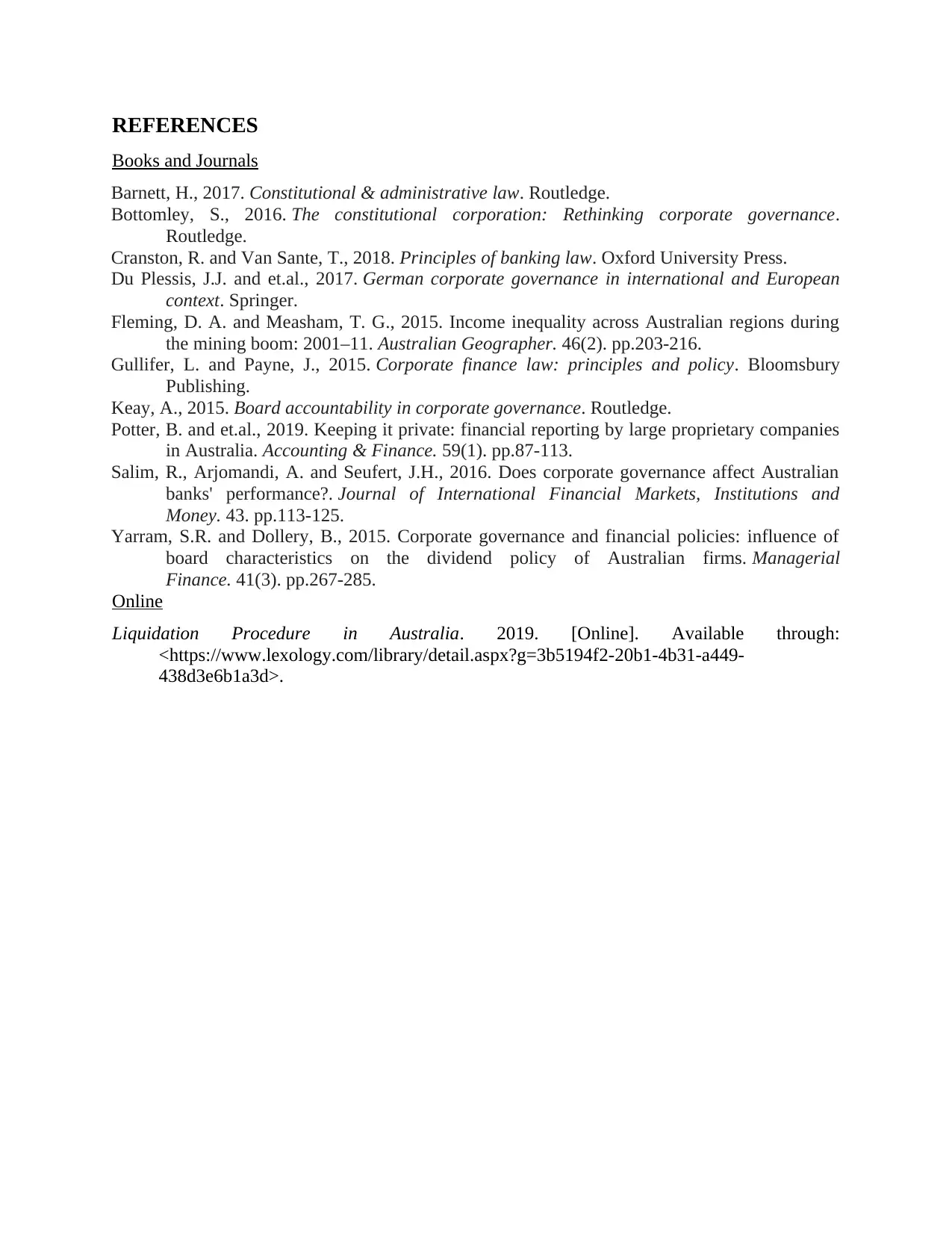
REFERENCES
Books and Journals
Barnett, H., 2017. Constitutional & administrative law. Routledge.
Bottomley, S., 2016. The constitutional corporation: Rethinking corporate governance.
Routledge.
Cranston, R. and Van Sante, T., 2018. Principles of banking law. Oxford University Press.
Du Plessis, J.J. and et.al., 2017. German corporate governance in international and European
context. Springer.
Fleming, D. A. and Measham, T. G., 2015. Income inequality across Australian regions during
the mining boom: 2001–11. Australian Geographer. 46(2). pp.203-216.
Gullifer, L. and Payne, J., 2015. Corporate finance law: principles and policy. Bloomsbury
Publishing.
Keay, A., 2015. Board accountability in corporate governance. Routledge.
Potter, B. and et.al., 2019. Keeping it private: financial reporting by large proprietary companies
in Australia. Accounting & Finance. 59(1). pp.87-113.
Salim, R., Arjomandi, A. and Seufert, J.H., 2016. Does corporate governance affect Australian
banks' performance?. Journal of International Financial Markets, Institutions and
Money. 43. pp.113-125.
Yarram, S.R. and Dollery, B., 2015. Corporate governance and financial policies: influence of
board characteristics on the dividend policy of Australian firms. Managerial
Finance. 41(3). pp.267-285.
Online
Liquidation Procedure in Australia. 2019. [Online]. Available through:
<https://www.lexology.com/library/detail.aspx?g=3b5194f2-20b1-4b31-a449-
438d3e6b1a3d>.
Books and Journals
Barnett, H., 2017. Constitutional & administrative law. Routledge.
Bottomley, S., 2016. The constitutional corporation: Rethinking corporate governance.
Routledge.
Cranston, R. and Van Sante, T., 2018. Principles of banking law. Oxford University Press.
Du Plessis, J.J. and et.al., 2017. German corporate governance in international and European
context. Springer.
Fleming, D. A. and Measham, T. G., 2015. Income inequality across Australian regions during
the mining boom: 2001–11. Australian Geographer. 46(2). pp.203-216.
Gullifer, L. and Payne, J., 2015. Corporate finance law: principles and policy. Bloomsbury
Publishing.
Keay, A., 2015. Board accountability in corporate governance. Routledge.
Potter, B. and et.al., 2019. Keeping it private: financial reporting by large proprietary companies
in Australia. Accounting & Finance. 59(1). pp.87-113.
Salim, R., Arjomandi, A. and Seufert, J.H., 2016. Does corporate governance affect Australian
banks' performance?. Journal of International Financial Markets, Institutions and
Money. 43. pp.113-125.
Yarram, S.R. and Dollery, B., 2015. Corporate governance and financial policies: influence of
board characteristics on the dividend policy of Australian firms. Managerial
Finance. 41(3). pp.267-285.
Online
Liquidation Procedure in Australia. 2019. [Online]. Available through:
<https://www.lexology.com/library/detail.aspx?g=3b5194f2-20b1-4b31-a449-
438d3e6b1a3d>.
1 out of 8
Related Documents
Your All-in-One AI-Powered Toolkit for Academic Success.
+13062052269
info@desklib.com
Available 24*7 on WhatsApp / Email
![[object Object]](/_next/static/media/star-bottom.7253800d.svg)
Unlock your academic potential
Copyright © 2020–2026 A2Z Services. All Rights Reserved. Developed and managed by ZUCOL.





